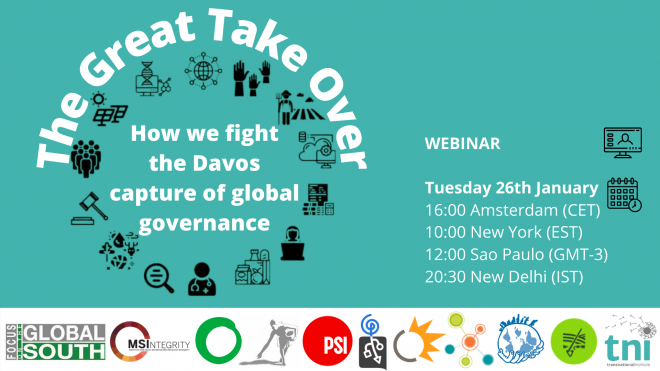Week of activities: Peoples VS Corporate Power – Transnational Institute
In the wake of the COVID-19 pandemic, transnational corporations are seeking to cement their control of global governance, ensuring it serves the interests of business and profits rather than the wellbeing of humanity. From January 25-30, social movements and international civil society will focus on the processes underway at the dialogues at Davos from January 25-30 2021. We have collected here an overview of the main civil society activities during the week of Davos, as well as key resources for everyone interested in learning more about the crisis of global governance, the transnational corporations’ false solutions, and the possibilities for new forms of global democratic governance
Introduction
In the wake of the COVID-19 pandemic, transnational corporations are seeking to cement their control of global governance, ensuring it serves the interests of business and profits rather than the well-being of humanity.
Transnational corporations are directly responsibile for many of the global crises we face. The solutions will only come from building a strong public, democratic and efficient multilateral system. It is urgent to expose the global and systemic trend towards corporate capture in various forums and uniting real democratic opposition.
A growing multisectoral coalition of social movements and international civil society networks are working together to analyze and unmask the global and systemic trend towards corporate capture, by showing how it operates in key sensitive areas, as well as taking the challenge to publicly denounce corporate interference in global governance and the evolution of a parallel “privatized multilateralism” made up of a myriad of “multistakeholer” bodies.
The World Economic Forum has developed and pushed for the privatization of global governance for decades. The ‘Great Reset’ is just the latest iteration of the gradual corporate takeover of global institutions, such as the UN and other international bodies, that take critical decisions over the governance of global common goods like food, water, health, internet and others.
Webinar: The Great Take Over – How we fight the Davos capture of global governance

This Webinar will address the ongoing take over of corporate capture and privatization of global governance. From a multi-sectoral perspective, key movements and sectors (Health, Food, Education, Environment, High Tech) will share their struggles, strategies and common challenges.
The Webinar will be presented in a dynamic and participatory format, an Open Forum will field the questions and comments from the floor. The Webinar will conclude with an Invitation to join the process of mobilization and Political Action during 2021.
Co-Organized by: Corporate Accountability, FIAN, Focus on the Global South, FOEI, G2H2, IT for Change, MSI Integrity, Peoples Health Movement, Public Services International, ETC Group, Transnational Institute.
1Note to activists
The audience for this educational packet are those activists who have focused part of their work on one UN organization and could benefit from understanding the governance context that surrounds that organization. One element of change in the global political dynamic is the introduction of multistakeholderism as a candidate structure for global governance. This mechanism allows TNCs to be direct participants in global governance and acts to co-opt multilateralism and civil society. At the same time there is a an evolving interest in a number of activist community to develop a more equitable and a more effective system of global governance, one that can amongst other things address multidimensional and systemic crises.
In order to make this packet more effective, it was been designed to allow the addition of supplemental slides with context specific to individual sectors. In Part One, for example, there are blank slides available for insertion in the history section and the section on MSism challenges to multilateralism (see slides 3 and 4 below). In Part Two, there are prototype slides available to explain in more detail the history of MSism in a specific sector and another blank slide for describing MS groups specific to a sector (see slides 5 and 6 below) . In Part Three, there are blank prototype slides each of the five sections that can used to identify new options for governing in specific sectors (see slides 7 to 11 below).
*** This article has been archived for your research. The original version from Google News can be found here ***


